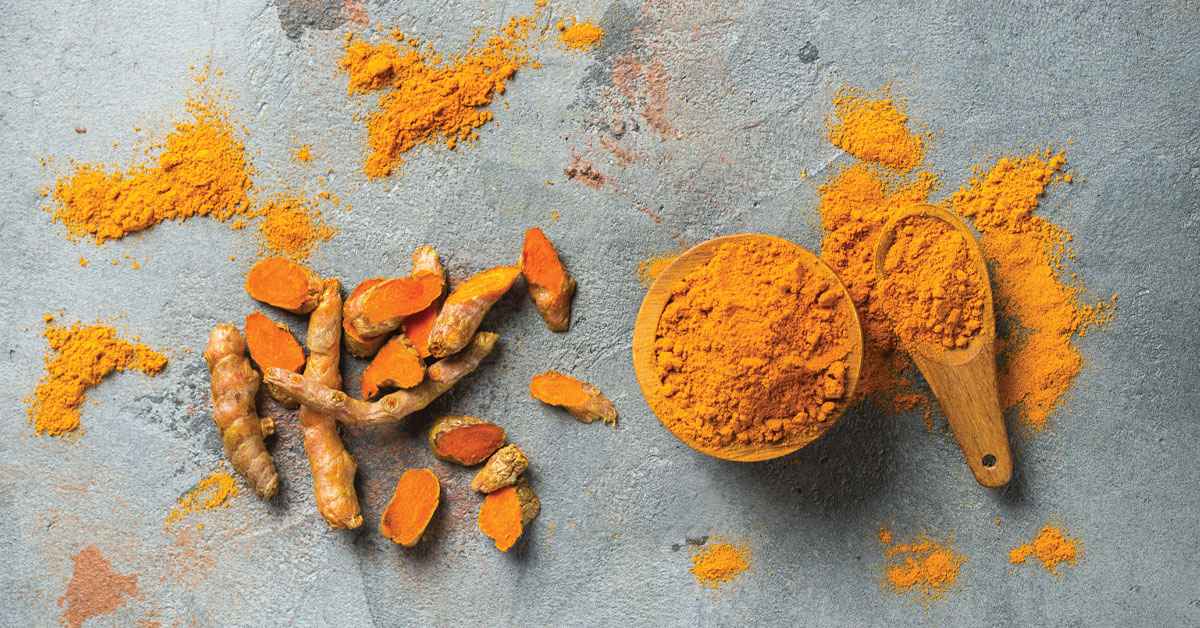





Long before we could head to the doctor’s office or a pharmacy for medication, our ancestors turned to nature for healing. They relied on plants, like turmeric, to stay healthy and recover from illness. Today, science has begun to explore what our ancestors already knew, and many studies have looked into the valuable medicinal properties of this yellow root. Find out their latest discoveries and the surprising health benefits of turmeric.
Turmeric or curcumin: that is the question.
You may recognize turmeric by the name curcumin. So what’s the difference between curcumin vs turmeric?
Turmeric (Curcuma longa) is a flowering root plant in the ginger family native to the Indian subcontinent and Southeast Asia.
Curcumin (C21H20O6) is a chemical produced in the rootstalk of turmeric plants. (Turmeric’s health benefits mostly come from curcumin.)
Because turmeric comes from places like India and Nepal, these cultures have always eaten a lot of it, and the history of turmeric goes way back.
Archeologists uncovered ancient pots in New Delhi, India with remnants of turmeric dating back to 2500 BC! Ancient Indians used the spice as an important healing ingredient in Ayurveda, a traditional medicine still practiced today.
Turmeric is so important to this region of the world that it has at least 53 different names in Sanskrit, including jawarantika (which cures fevers), kashpa (killer of worms), varna datri (enhancer of body complexion), and vishagni (killer of poison). You can probably guess some of turmeric’s traditional uses in medicine.
We’ve got good news if you like Indian food. Adults in Southeast Asia—places that eat foods with turmeric—have lower rates of specific illnesses. Scientists decided to explore the link between turmeric and good health. So what did they discover? Find out all the surprising health benefits of turmeric, backed by science.
Turmeric can help improve memory. A double-blind, placebo-controlled study observed the effects of curcumin in adults between the ages of 50 to 90. After 18 months, the people who took curcumin improved their memory by 28%!
After observing certain patterns in adults in Southeast Asia, a region that eats lots of curries containing turmeric, scientists decided to take a closer look at the link between curry consumption and brain health.
A study that observed adults between ages 60 to 90 found those who ate curry more than once a month performed better on cognitive tests.
Curcumin has also been shown to help clears blockages between nerve cells in the brain.
To fight off infection, the body sends white blood cells to defend against outside invaders, like viruses or bacteria. It’s a process known as inflammation.
But, sometimes the body’s immune system triggers inflammation when it doesn’t need to fight off anything. Instead, the body attacks and damages healthy tissue. Over time, this type of long-term inflammation can cause a lot of damage.
Inflammation can also impact the brain. Turmeric’s main active component curcumin has anti-inflammatory properties. A study found that curcumin’s anti-inflammatory properties may protect the brain and help improve memory and attention.
Curcumin (found in turmeric) promotes healthy levels of neurotransmitters like serotonin and dopamine and can ease inflammation. Curcumin also promotes healthy insulin levels in the brain—affecting the way your brain processes glucose for energy.
When the body breaks down foods or reacts to the environment, its cells produce waste particles called free radicals. These unstable, reactive molecules cause oxidative stress which can damage cells if not eliminated.
That’s where turmeric can step in and help. Studies found turmeric does a great job at removing free radicals from your system, thanks to its antioxidant effects.
So what does that mean for your health? Turmeric protects against free radical damage, and therefore, helps prevent a host of health conditions, including heart disease, dementia, cataracts, glaucoma, and macular degeneration.
When ground up and turned into a powder, turmeric gives foods a deep-orange or yellowish hue (hence, the nickname “the golden spice”). You’ll recognize turmeric’s chalky, peppery flavor in curries and rice dishes of Southeast Asia and the Middle East. Try a few of our favorite ways to get your regular dose of turmeric:
Turmeric isn’t just for foods. It also provides a great topical treatment. Try mixing it with honey and yogurt for a DIY face mask for glowing skin.
Doctors recommend between 500 to 1,000 milligrams, depending on the individual. If your regular eating habits don’t match up with the taste of turmeric, try taking supplements.
“Let food be thy medicine!” This ancient saying has become more and more true as science takes a closer look at the foods we eat. Make sure to prioritize turmeric in your diet for its many health benefits for the brain and body.
Want more healthy foods and recipe ideas? Check out our new ebook: Food for Thought: Recipes for a Healthier Brain.

Take advantage of our hassle-free monthly auto-ship program to ensure that you never go a day without your favorite brain boosting NeuroQ formula. You can cancel your monthly auto-ship at any time.
As a member you can expect: